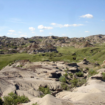What’s Up Doc? The pleasures and perils of winter
By Dr. Noorali Bharwani on November 12, 2019.
Winter is here! Some people have died. Some have exacerbation and/or complication of their pre-existing conditions. Some have broken bones. Some have flu. Some are depressed. The lucky ones – if that is an appropriate word for them – are in Hawaii or Florida. Some are in Arizona or Palm Springs. Some are on a cruise in Bahamas or South America. Some are on the big mountains, gyrating down the slopes on their ultra super speed skis. The big chill does create a new dynamics in peoples’ lives. As soon as the leaves start gathering on the ground, we are gripped with fear or joy depending on what we have planned for the snowy days. But we carry on. Sometimes smiling, sometimes annoyed and sometimes angry. Each morning, we get ready for work in our best winter clothes. At work, the heating is on and the windows are shut. Your comfort level goes down. Your smile fades and your layers start coming off. You look out of the window for some inspiration and comfort. You see a pile of snow. You feel trapped Do you find this stressful? Does this affect your health? About 50% of deaths in winter are related to coronary artery disease and blood clots in the brain. Studies have shown that most deaths occur 24 hours after cold days. This appears to be due to brief rather than prolonged exposure to cold. Resulting in rapid changes in the blood viscosity, formation of blood clot and increase demand for oxygen by heart muscles. Those who are already known to have coronary artery disease are prone to spasm of these vessels. This further aggravates the risk of heart attacks. Asthmatics run the risk of aggravating their condition by inhaling cold air especially during exercise. The precise mechanism of cold-induced changes is being hotly debated by the experts. Engorgement of blood vessels and release of substances which produce spasm of lung vessels are responsible for asthmatic attacks. Patients with Raynaud’s disease suffer significant spasm of blood vessels of hands and feet when exposed to cold. This occurs mainly in young healthy women. Their blood vessels are extremely sensitive to cold or emotions. In most of these conditions, the underlying mechanism appears to be the effect of cold on blood vessels. Asthmatics, who want to enjoy winter sports, should keep inhalers (bronchodilators) handy at all times. People with heart problems should wear a light face mask to maintain a favorable air temperature and humidity during exertion. Warm clothings, mittens, gloves and socks should protect the rest of the body from the big chill. Remember, better safe than sorry! We still have almost four months of winter to enjoy. Keep smiling! Dr. Bharwani is a general surgeon, freelance writer, photographer and author of A Doctor’s Journey and Doctor B’s Eight Steps to Wellness. His latest book is available at Shoppers Drug Mart and Coles Book Store (Medicine Hat Mall), and http://www.nbharwani.com. You can discuss this article and other articles on his website: nbharwani.com and sign up for RSS feed, Twitter or get on the email list. 15-14




